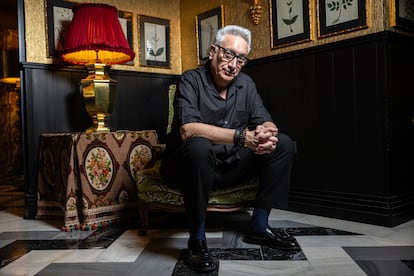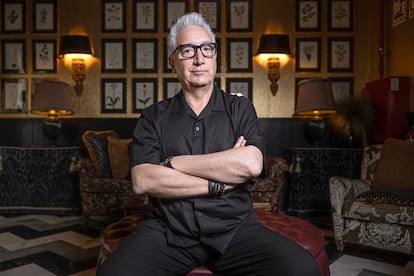Born in Venezuela, in 1961, Moisés Kaufman has his residence in New York since 1987. Jewish descendant of survivors of the Holocaust, director of theater, playwright and founder of the prestigious company Tectonic Theater Project, Kaufman has traveled to Madrid to attend the official premiere of the work Blueberriesco-written with Amanda Gronich, a whole exploration of the daily life of Nazi officers in the Auschwitz extermination field, whose Spanish version Sergio Peris-Mencheta directs. Creator of the famous and successful assembly The Laramie project, On the murder of a gay student in Wyoming in 1998, Kaufman says homosexuals feel threatened with the arrival of Donald Trump to power.
Ask. He was on Wednesday at the official premiere of Blueberries. What impression did you get?
Answer. It was very exciting. It is a beautiful assembly. Normally, I direct the works I write, but there are exceptions like this. Writing a play is an act of faith and you have to trust the direction. He Blueberries Sergio has fascinated me.
P. Are there differences with the one directed by you?
R. Completely. The assembly is absolutely different and what I love is that the same text can be mounted so differently and with good results.
P. In this version the actors do not come out to receive applause. What do you think of this idea?
R. At first I didn’t like it very much, but seeing the result I think it’s a very dignified and right option. The theme of the work is not something that you want to celebrate and leaves room for reflection.
P. How did the idea of making theater come from a photo album?
R. I am the son of survivors of the Holocaust and I have always wanted to do something on this subject. I thought you could not tell more about it, but inspiration came after the discovery of these unpublished photos. Now we are in a historical moment in which there has been a turnaround and scholars and academics have focused on the investigation of those responsible for the Holocaust, on an attempt to understand what led them to do these barbarities, as they were able to do what they did. Blueberriesfocused on the fields of the fields, somehow, that path continues.
P. What teachings can be taken from the leisure images of Nazi officers in the most cruel extermination field in history?
R. Each spectator will draw their own conclusions. I am interested in influencing the reflection that there are guilty people, complicit people and complacent people. Josef Mengele was guilty, it was the one who decided, on the arrival of the trains, who went to the gas cameras and who did not; Auschwitz’s telephone operators did not kill anyone, but they were accomplices, they sent a Telex to Berlin every day in which they gave the figure of those who were sent to the gas cameras and those who went to the work fields, that is, they knew what happened, and then there were those who lived in the cities and towns around the fields, who saw what was happening. These were the complacent. All this leads us to ask ourselves, in these difficult times and surrounded by conflicts, where we are each of us. Am I guilty, am I complicit or complacent? And if I am complacent, what is my responsibility.
P. What relatives died or survived the Holocaust?
R. On the part of my father, many were killed in concentration camps. A maternal uncle was in the Auschwitz field just when these photos were taken, and other relatives of my mother also died.
P. As a relative of survivors, what do you feel before this show?
R. It is a feeling of absolute fury. There were many moments, working on the trials, seeing the photos of these Nazi officers playing the accordion, illuminating a Christmas tree or eating blueberries (Blaubeeren, in German) in a holiday villa, within the concentration field, which we had to stop, go to have a beer and look for the necessary distance to continue.

P. Do you feel that with this work a tribute pays for your Auschwitz relatives?
R. Definitely. As they did not have tombs and were buried in common graves, there is nothing that can remember them. This work is my way of putting a tomb with your name.
P. Are we in a historical moment of white supremacism?
R. We are in a really dangerous moment, in which so many countries are turning right. It makes me think that as a human race we have ceased to evolve, we have stopped growing, we have not learned anything that history teaches us. I see around me that we are making the same mistakes all the time. It is a vision perhaps pessimistic.
P. What do you think is due to the progress of ultra -right?
R. When we had a moment of great hope, because democracies work better the greater the knowledge people have. Then we thought that the Internet was a way that information, education and good ideas reach everyone. We believed that democracies would reach a higher level of strength and well -being. Unfortunately, the opposite has happened. The Internet has become an echo chamber where you only hear what you agree with. We have stopped believing in science and evidence and, without correct knowledge, leaders can do with you what they want.
P. As a Jew, what do you feel before the killings that Gaza are raising?
R. I think that when you see the photos of the work, which teach you such a specific moment in history, it forces us to think about what one would do in a situation like this. Regardless of what each one thinks about what is happening, this work makes you assume a responsibility.
P. But how do you live?
R. What I live terrible is to see how there are as many things that happened and that are shown in the play. I hope that the public asks himself questions of how this situation assumes each of them.
P. Are we more intolerant than ever against the different?
R. We have become more apathetic. Every day we are more complacent.
P. Complacement with what happens in Gaza too?
R. Complastic with all the horrors that are happening in the world.
P. How do you live today in a country with Trump of President?
R. Donald Trump is the greatest misfortune in the history of the United States. It is an absolutely scary moment. He is a person who came to power democratically and does not believe in any democratic institution. The artists are very scared because it has retired the entire budget to the National Endowment for the Arts (National Fund for the Arts).
P. And how Venezuelan?
R. It is very painful to see that what I lived with (Hugo) Chávez, a person who was democratically chosen and destroyed all democratic institutions is being repeated in the US. It is like a already seen horrible.
P. Do you live with fear?
R. Yes. With fear and horrible uncertainty.
P. The street seems to start talking. The demonstrations in Los Angeles have also moved to other cities. Is it hopeful?
R. Yes. There are two things that give us reasons of hope. One is the people who are dating the streets and the other that gives hope is that Trump, apart from being a dictator, is a jerk and an incompetent. Although he wants to transform democracy into something else, Trump has neither intelligence nor the tools to do so.
P. Do you miss a president as Obama, who granted him the National Medal of Arts?
R. Every day. Obama was a brilliant president and with a democratic and responsible conscience with the American people as a whole.
P. Its function The Laramie project He revolved around death in 1998 of a gay student in Wyoming. Does the persecution of homosexuality follow?
R. Go on. There are still many countries in which it is not only illegal, but one can be sentenced to the death penalty for being homosexual. In the US much of hate against homosexuality with the arrival of Trump has transformed into hatred to the trans world.
P. What role can theater play in such a confusing and violent world?
R. I aspire that the theater that I believe provides a space where we can all enter together to see us as human beings and try to reflect on the world we want to create.

